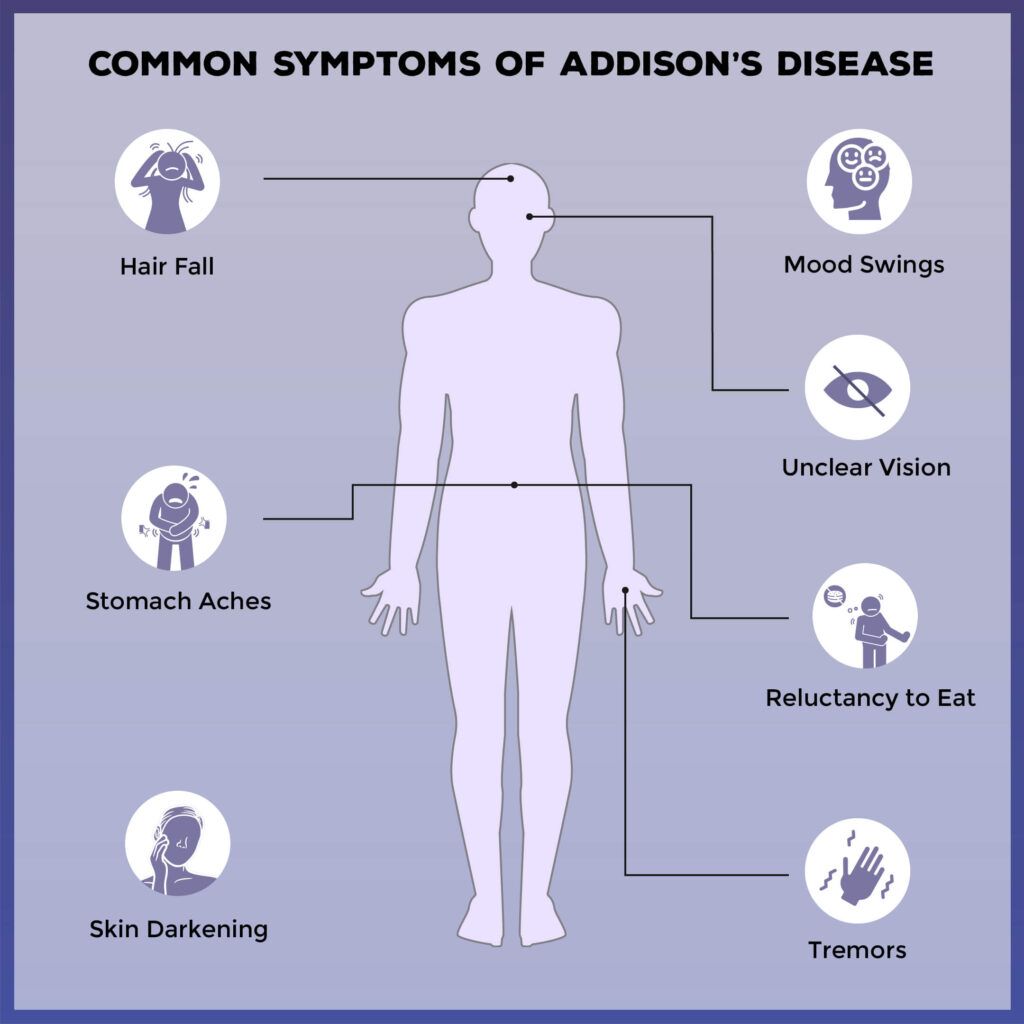What is Addison's Disease?
Addison's disease is an adrenal insufficiency disorder in which the adrenal glands do not make a sufficient amount of a few hormones, including cortisol.
This disorder can occur in people of all ages and genders.
Since levels of essential hormones like cortisol are lower, Addison's disease can be life-threatening.
Addison's disease is considered an autoimmune disorder as it occurs due to the improper functioning of the immune system that results in attacking the adrenal glands.
This affects the hormone production by the adrenals.
Check your 23andMe raw data for variants in Addison's Disease
Symptoms and Causes of Addison's Disease
Symptoms of Addison's Disease
A few common symptoms of Addison's disease are:
- Chronic fatigue
- Muscle weakness
- Weight loss
- Loss of appetite
- Abdominal pain
Other symptoms of this disorder include:
- Nausea
- Vomiting
- Diarrhea
- Low blood pressure, which gets aggravated when changing posture, often resulting in dizziness or fainting
- Irritability
- Joint pain
- Craving salty food
- Depression
- Irregular menstrual cycle
- Loss of libido
Some people with Addison's disease may have darkened skin that is more visible on scars and folds of the skin.
Since Addison's disease develops slowly over a long period, minor changes and symptoms are often overlooked.
If you feel any of the symptoms of Addison's disease mentioned above, visit your doctor for an evaluation and prompt treatment to avoid an adrenal crisis.
Image: Is Addison’s Disease Genetic? Common Symptoms
Causes of Addison's Disease
Addison's disease occurs when immune system cells attack and damage the outer part of the adrenal gland (called the cortex).
When over 90% of the adrenal cortex is damaged, the gland cannot produce sufficient hormones, resulting in Addison's disease.
It is still unclear why people develop this autoimmune disorder, but researchers speculate this disease may run in families.
Other causes of Addison's disease are:
- Tuberculosis (the most common cause of Addison's disease globally)
- Infections like AIDS
- Heavy bleeding in the adrenal gland (hemorrhage)
- Adrenal cancer
- A build-up of amyloid protein in the adrenal gland
- Surgical removal of both the adrenals
- Few treatments required for Cushing's syndrome (characterized by very high levels of cortisol)
Is Addison's Disease Genetic?
Besides familial history, researchers also indicate that a few genes may increase an individual's risk for Addison's disease.
Studies show that the most common genes associated with Addison's disease belong to the human leukocyte antigen or HLA complex.
The HLA complex genes help the body's immune system differentiate between the body's proteins from those made by viruses and bacteria.
The most well-known risk factor for Addison's disease is a variant of the HLA-DRB1 gene, also called the HLA-DRB1 *04:04.
This variation of the HLA-DRB1 gene results in an abnormal immune response, damaging the adrenal cortex and causing Addison's disease.
The exact mechanism of how this gene damages the adrenal cortex is still unknown.
Learn About Polyglandular Autoimmune Syndrome, Type 1 (involving the skin, the parathyroid glands, and the adrenal glands) With The Carrier Status Report.
Diagnosis, Treatment, and Management of Addison's Disease
Diagnosis
Based on symptoms, if the doctor suspects Addison's disease, they may take a detailed medical and familial history.
They may also screen for skin discoloration in areas such as:
- Creases of your palm
- Elbow crease
- On scars
- On lips and gums
The doctor will also check your blood pressure for hypotension, especially when you change position.
Diagnostic tests for Addison's disease include:
- Blood tests that measure levels of sodium, potassium, glucose, adrenal antibodies, and hormones like ACTH.
- Synacthen stimulation test
- Thyroid function test
- CT or MRI scans
Treatment and Management
Medications are common treatment options for Addison's disease.
The most common and effective treatment for Addison's disease is hormone replacement therapy.
This treatment corrects or restores the steroid hormone the body is not producing adequately.
- Hydrocortisone, prednisone, or methylprednisolone replace cortisol and can be prescribed to mimic the hormone. This helps manage symptoms of Addison's disease.
- Fludrocortisone acetate may be given to replace aldosterone.
Other tips for managing Addison's disease include:
- Keep a medical alert on your phone or wear an emergency bracelet.
- Carry a glucocorticoid injection kit with you always.
- Always keep your doctor appointments and keep in touch with them.
- Undergo annual checkups.
Summary
- Addison's disease or adrenal insufficiency is a rare autoimmune disorder in which essential hormones are insufficiently produced.
- A few common symptoms of Addison's disease include chronic fatigue, weight loss, loss of appetite, and abdominal pain.
- Some people with Addison's disease have darkened skin scars and natural body folds.
- Addison's disease is caused when the body's immune cells attack the cells in the adrenal cortex due to some factors.
- Addison's disease may occur due to familial history and genetic mutations.
- The most well-known genetic causative factor of Addison's disease is the variation in the HLA-DRB1 gene.
- Besides clinical examination, diagnostic tests for Addison's disease include blood tests, blood sugar tests, and the synacthen stimulation test.
- Addison's disease is treated and managed using medications that mimic the deficient adrenal hormone.
References
- https://medlineplus.gov/genetics/condition/autoimmune-addison-disease/
- https://rarediseases.info.nih.gov/diseases/5740/addisons-disease
- https://www.nhs.uk/conditions/addisons-disease/causes/
- https://www.news-medical.net/news/20210211/Variants-of-nine-genes-induce-a-higher-risk-of-developing-Addisons-disease.aspx
- https://www.niddk.nih.gov/health-information/endocrine-diseases/adrenal-insufficiency-addisons-disease/symptoms-causes
- https://www.nhs.uk/conditions/addisons-disease/treatment/
- https://www.mayoclinic.org/diseases-conditions/addisons-disease/diagnosis-treatment/drc-20350296





